7 Powerful Strategies for Maximizing Affiliate Marketing on Facebook
Affiliate marketing on Facebook is one of the most effective strategies to boost your online earnings and expand your reach. This guide will walk you through every step you need to take to maximize your affiliate marketing efforts on Facebook, from setting up your profile to leveraging advanced strategies for sustained success.
Table of Contents
1. Introduction to Affiliate Marketing on Facebook
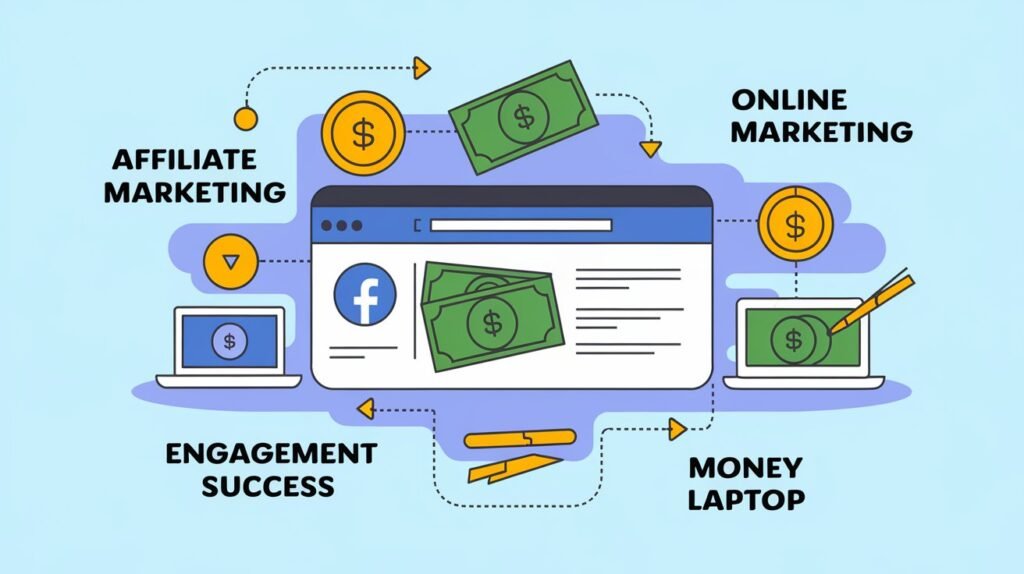
2. Getting Started with Facebook Affiliate Marketing
With over 2.9 billion active users, Facebook is a goldmine for affiliate marketers. Its vast reach and sophisticated targeting options make it an ideal platform for driving traffic and increasing conversions. Whether you’re new to affiliate marketing or a seasoned pro, optimizing your Facebook strategy can significantly enhance your earnings. Maximizing affiliate marketing on Facebook isn’t just about posting links. It involves understanding the platform’s nuances, engaging with your audience, and continuously refining your strategies. By doing so, you can:
- Increase your visibility and brand awareness.
- Drive high-quality traffic to your affiliate offers.
- Build a loyal community that trusts your recommendations.

2.1 Setting Up a Strong Foundation
1. Create and Optimize Your Facebook Business Page
Your Facebook Business Page is your brand’s online storefront. Here’s how to set it up effectively:
- Branding: Use a professional profile picture and cover photo that reflects your niche.
- Bio and About Section: Clearly define what your page is about and include a call-to-action (CTA) encouraging visitors to follow or visit your website.
- Vanity URL: Customize your page URL to make it easy to remember and share.
2. Leverage Facebook Groups
Facebook Groups offer a community-driven platform where you can engage directly with your audience.
- Create a Niche-Focused Group: Start a group centered around the interests of your target audience. Provide value by sharing tips, engaging in discussions, and subtly introducing your affiliate products.
- Engage Regularly: Consistent engagement, such as responding to posts and hosting live sessions, helps build a community that trusts your recommendations.
3. Optimize Your Personal Profile
If you prefer using your personal profile for affiliate marketing, ensure it’s optimized:
- Professional Profile Picture and Cover Photo: Even if it’s your personal account, maintain a professional appearance.
- Intro Section: Include a brief description of your expertise and a link to your affiliate page or blog. For optimizing your Facebook Business Page, include a link to “On-Page SEO“.
- Privacy Settings: Adjust your privacy settings to control what your audience sees.
3. Best Practices for Promoting Affiliate Links
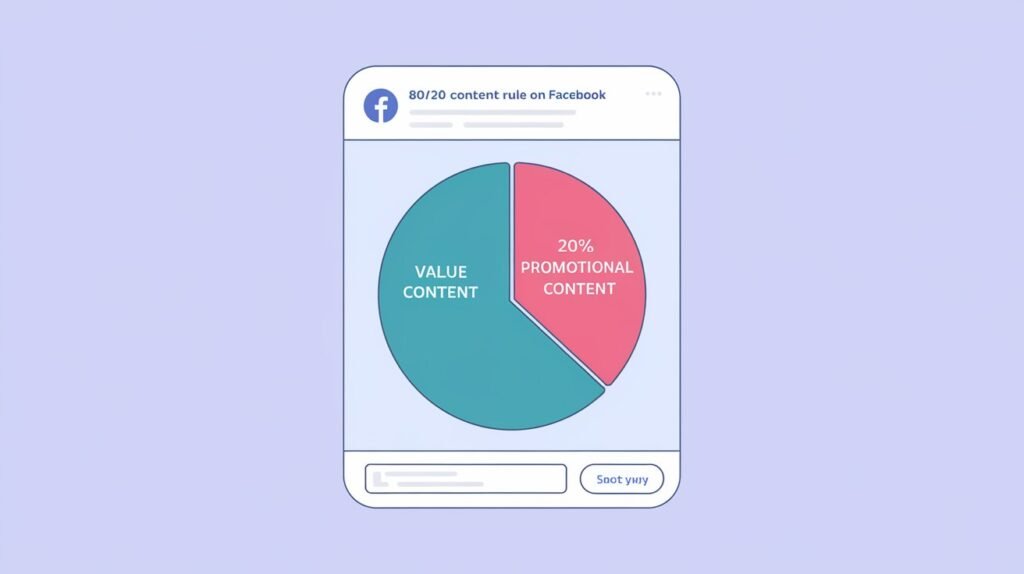
3.1 Organic Strategies for Affiliate Marketing
Organic marketing involves promoting your affiliate products without paid ads. It’s a cost-effective way to build a long-term presence on Facebook.
1. Content Creation: The 80/20 Rule
Follow the 80/20 rule: 80% of your posts should provide value (tips, tutorials, infographics), while 20% should be promotional. This keeps your audience engaged without feeling overwhelmed by ads.
- Educational Posts: Write posts that educate your audience about the benefits of the products you’re promoting. Include affiliate links where relevant.
- Visual Content: Use images, videos, and infographics to make your posts more engaging. Tools like Canva can help you create stunning visuals easily.
2. Engaging with Your Audience
Engagement is key to building trust. Respond to comments, ask questions, and encourage discussions on your posts. This not only boosts your posts’ visibility but also builds a community that values your opinions.
3. Utilizing Facebook Stories
Facebook Stories are a great way to share quick, engaging content with your audience. Use them to showcase products, share behind-the-scenes content, or announce limited-time offers. The ephemeral nature of Stories can create a sense of urgency, driving more clicks on your affiliate links.
3.2 Paid Advertising Strategies
Facebook Ads are a powerful tool for reaching a wider audience. Here’s how to use them effectively:
1. Creating Targeted Facebook Ads
- Audience Insights: Use Facebook’s Audience Insights tool to understand your target audience’s demographics, interests, and behaviors.
- Ad Copy and Creatives: Write compelling ad copy that speaks directly to your audience’s pain points. Use high-quality images or videos to grab attention.
- Ad Placement: Experiment with different ad placements, including News Feed, Stories, and Audience Network, to see which delivers the best results. To explore advanced tips on using Facebook Ads for affiliate marketing, consider reading this ClickBank article that offers practical insights.
2. Budgeting and ROI Optimization
- Start Small: Begin with a modest budget and gradually increase it as you see results.
- Track Performance: Use Facebook Ads Manager to monitor your ads’ performance. Focus on metrics like click-through rate (CTR), conversion rate, and return on ad spend (ROAS).
- Retargeting Campaigns: Use Facebook’s retargeting feature to reach users who have previously interacted with your content but haven’t converted.
4. Advanced Strategies for Increased Engagement
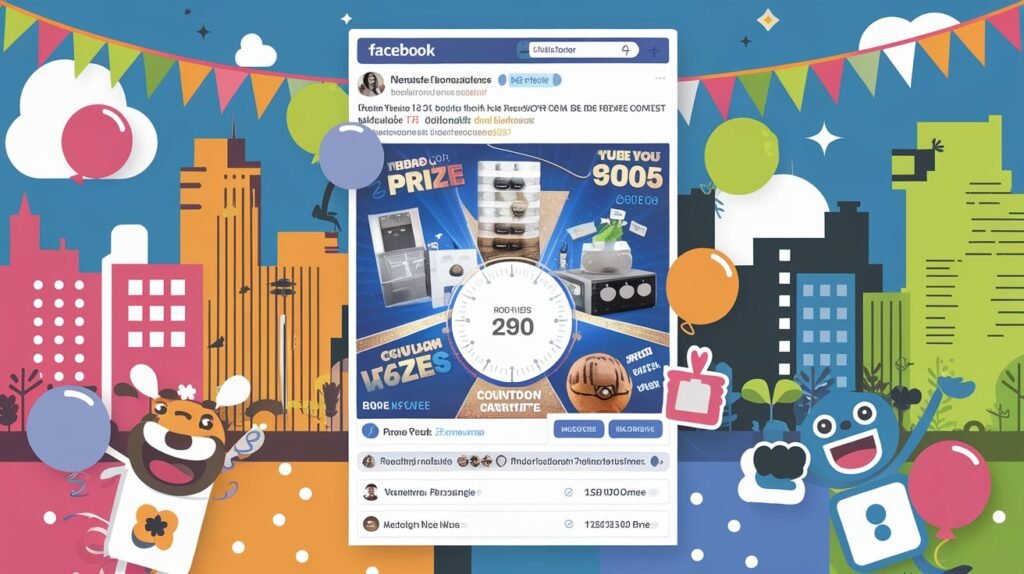
4.1 Hosting Contests and Giveaways
Contests and giveaways are a fun way to engage your audience while promoting your affiliate products.
- Choosing a Prize: Select a prize that is closely related to the affiliate products you promote. This ensures that the participants are genuinely interested in your niche.
- Entry Requirements: Ask participants to like your page, share the post, or comment on the giveaway to enter. This increases your page’s visibility and engagement.
- Legal Considerations: Ensure that your contest complies with Facebook’s promotional guidelines and local laws.
4.2 Utilizing User-Generated Content
Encouraging your audience to create content related to your affiliate products can significantly boost your credibility and reach.
- Encourage Reviews and Testimonials: Ask your customers to share their experiences with the products you promote. Offer incentives like discounts or freebies for honest reviews.
- Feature User-Generated Content: Showcase these reviews on your Facebook page. It provides social proof and encourages others to make a purchase.
4.3 Cross-Promoting in Relevant Groups
Joining and participating in Facebook Groups that align with your niche can expand your reach.
- Provide Value First: Before promoting your products, establish yourself as a helpful and knowledgeable member of the group.
- Share Relevant Content: Post articles, tips, or tutorials that relate to the group’s interests and subtly include your affiliate links where appropriate.
- Respect Group Rules: Always adhere to the group’s rules to avoid being banned. Most groups have specific guidelines on promotional content.
5. Tracking and Analyzing Performance
5.1 Key Metrics to Monitor
Tracking your performance is crucial to understanding what works and what doesn’t.
- Facebook Insights: Use Facebook Insights to monitor your page’s performance. Key metrics include engagement rate, reach, and click-through rate.
- Third-Party Tools: Tools like Google Analytics, Bitly, or UTM parameters can help track the performance of your affiliate links.
- Conversion Rate: Monitor how many of your clicks result in conversions. This helps in refining your strategies and focusing on high-converting content.
5.2 Continuous Optimization
The key to long-term success in affiliate marketing is continuous optimization.
- A/B Testing: Regularly test different elements of your posts, ads, and landing pages to see what resonates best with your audience.
- Content Calendar: Plan your posts using a content calendar. This ensures a consistent posting schedule, keeping your audience engaged.
- Feedback Loop: Regularly ask your audience for feedback on your content and promotions. This can provide valuable insights into what they want to see more of.
6. Compliance and Transparency
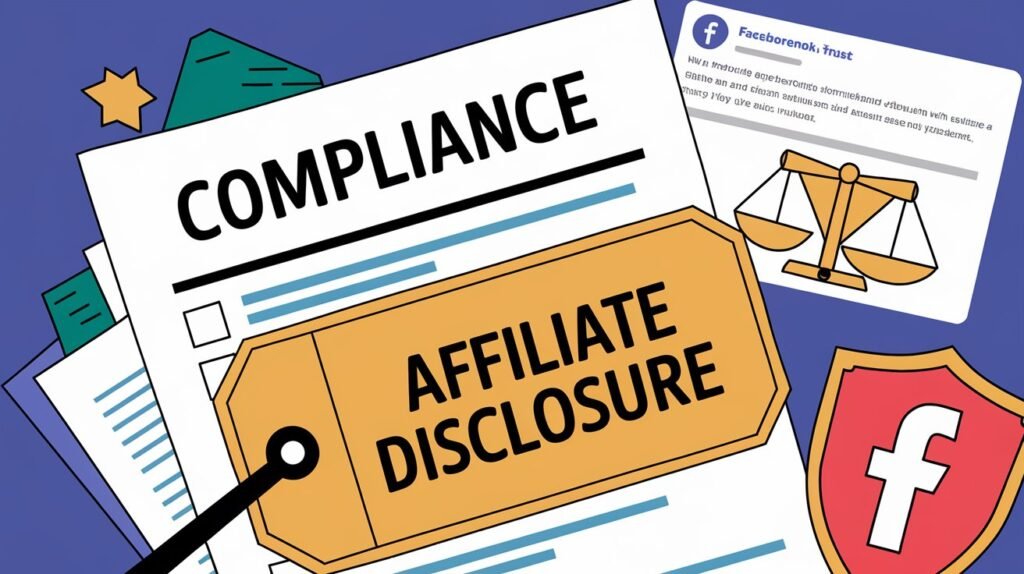
6.1 Adherence to Facebook and FTC Guidelines
Compliance is crucial to maintaining your account and credibility.
- Clear Disclosures: Always disclose your affiliate relationships in your posts. This can be as simple as adding an “affiliate link” in your post.
- Follow Facebook’s Ad Policies: Ensure that your ads comply with Facebook’s advertising policies to avoid account suspension.
6.2 Building Trust Through Transparency
Transparency builds trust, which is essential for long-term success in affiliate marketing.
- Honest Reviews: Only promote products that you truly believe in. Your audience can tell when a review is genuine, and they’ll appreciate your honesty.
- Engage in Conversations: Be open about your affiliate relationships when asked. This not only builds trust but also helps in nurturing long-term relationships with your audience.
7. Leveraging Facebook’s Unique Features
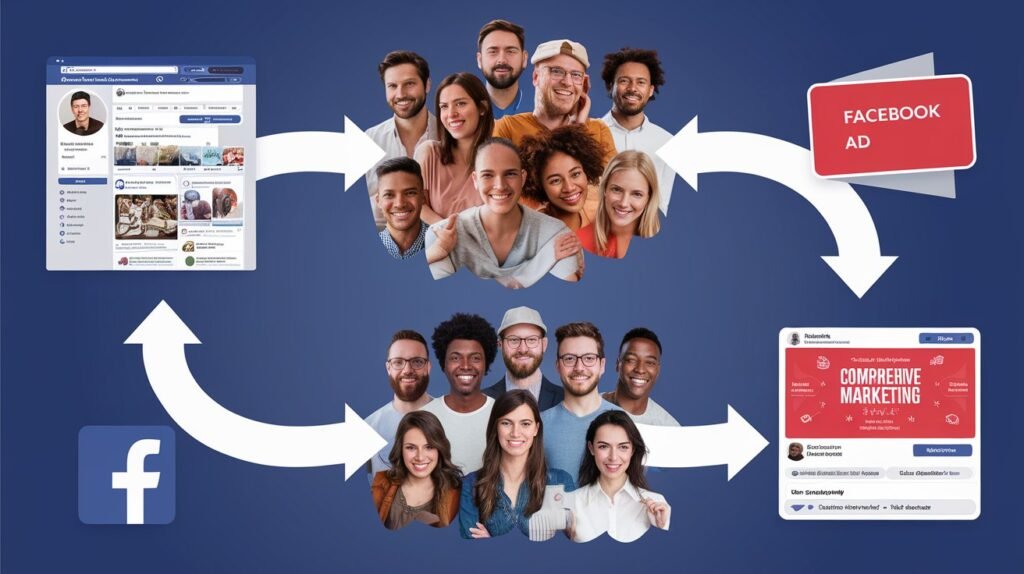
7.1 Integrating Facebook Pages, Groups, and Ads
Combining your Facebook Page, Groups, and Ads creates a powerful marketing trifecta.
- Create a Cohesive Strategy: Align the content on your page, group, and ads to create a unified message that resonates with your audience.
- Use Ads to Drive Group Growth: Run ads to promote your Facebook Group and attract like-minded individuals who are interested in your niche.
7.2 Utilizing Facebook Messenger Bots
Facebook Messenger bots can streamline communication and boost engagement.
- Set Up Automated Responses: Use Messenger bots to answer common questions, provide product recommendations, and share affiliate links.
- Personalized Messaging: Customize your bot’s messages based on user behavior to create a more personalized experience.
Conclusion
Maximizing affiliate marketing on Facebook requires a well-rounded strategy that integrates content creation, audience engagement, ethical promotion, and data-driven optimization. By setting up a professional Facebook presence, using both organic and paid strategies and continuously analyzing your performance, you can leverage Facebook’s vast reach to drive substantial traffic and conversions.
The key to long-term success lies in building trust and transparency with your audience while staying adaptable to Facebook’s ever-evolving landscape. As you implement these strategies, don’t hesitate to explore additional resources and continuously refine your approach.
By following these best practices and utilizing external resources, you can position yourself as a trusted advisor in your niche, driving sustained affiliate revenue through Facebook.
FAQ's
To start affiliate marketing on Facebook, create and optimize a Facebook Business Page or Group centered around your niche. Engage your audience with valuable content and use affiliate links strategically. Also, consider running targeted Facebook Ads to expand your reach.
Always disclose your affiliate relationships clearly in your posts. Use hashtags like #ad or #affiliate, and familiarize yourself with Facebook’s advertising guidelines to avoid penalties. Adhering to FTC regulations is also crucial.
The most effective organic strategies include creating value-driven content, using Facebook Stories for quick promotions, and engaging with your audience regularly through comments and posts. Also, leverage Facebook Groups to build a community around your niche.
Use Facebook Insights and third-party tools like Google Analytics to track key metrics such as click-through rates (CTR), conversion rates, and engagement. Regular analysis will help you optimize your strategies for better results.
Yes, Facebook Ads can be very effective for affiliate marketing. They allow you to target specific demographics and interests, making it easier to reach potential customers. However, it’s important to start with a small budget, test different creatives, and optimize your campaigns based on performance data.
To increase engagement in your Facebook Group, regularly post valuable content, host interactive sessions like live Q&As, and encourage members to share their experiences and feedback. Contests and giveaways can also boost participation.
Follow the 80/20 rule: 80% of your content should provide value, while only 20% should be promotional. This approach helps maintain audience trust and prevents your posts from feeling too sales-oriented.
Building trust involves being transparent about your affiliate relationships, engaging with your audience regularly, and consistently providing valuable, honest content. Highlighting real user testimonials and case studies can also enhance credibility.
